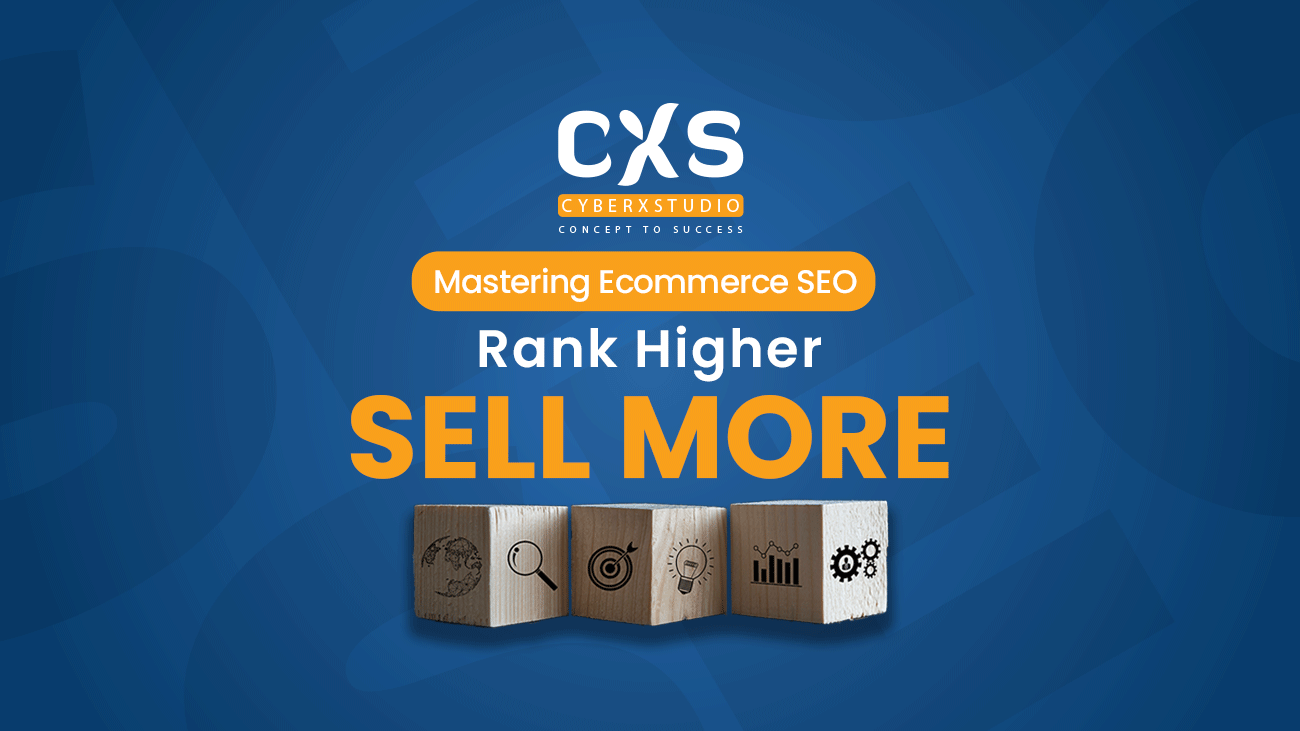Are you drained of being at last in the online competition? Do you need help to make your ecommerce website stand out from the crowd? It’s time to harness the power of Ecommerce SEO!
With ecommerce SEO, you can reach a wider audience, drive more traffic to your website, and ultimately increase sales. But where do you start? In this comprehensive ecommerce SEO blog, we will guide you through everything you want to know about ecommerce SEO, from the different types of ecommerce SEO to the benefits it can bring to your business. You’ll learn how to optimize your ecommerce site for SEO, including tips on keyword research, on-page optimization, technical SEO, mobile optimization, link building, and content marketing.
We will also discuss the importance of local ecommerce SEO and provide tips on how to measure the success of your ecommerce SEO campaigns. Moreover, if you are a Shopify user, we will show you how to leverage the true power of SEO to boost your online presence.
So, let’s dive in and dominate your online market with ecommerce SEO!
What Is Ecommerce SEO?
Ecommerce SEO refers to optimizing your ecommerce website to boost its visibility on search engine results pages (SERPs). The ultimate goal of ecommerce SEO is to increase the quantity and quality of organic traffic to your website, thereby improving sales.
Through ecommerce SEO, you can enhance your search engine rankings, attract more targeted traffic, and drive sales. It involves various techniques and strategies, such as keyword research, on-page optimization, technical SEO, mobile optimization, link building, and content marketing.
Benefits of Ecommerce SEO
Implementing ecommerce SEO strategies for your online business can bring numerous benefits. Here are some of the benefits that can help you achieve your business goals and grow your online presence:
- Increased visibility on SERPs
- More targeted traffic to your site
- Increased sales and revenue for your business
- Improved credibility and trust with your audience
- The cost-effective way to compete with larger businesses
- Enhanced online presence and established leadership in your niche
Why is Ecommerce SEO Different From Regular SEO?
Although ecommerce SEO shares some similarities with traditional SEO, it’s essential to recognize its key differences. By understanding the difference in creating product pages, conducting keyword research, implementing technical SEO, and executing local SEO, you can enhance your SEO strategies for your ecommerce site and attain improved outcomes. Here are some of the key ways in which ecommerce SEO differs from traditional SEO:
Product Pages
Creating product pages is a crucial aspect of ecommerce SEO, as each product page should be optimized for relevant keywords and include important information such as product descriptions, pricing, and images. This differs from traditional SEO, which may focus more on optimizing informational pages such as blog posts or landing pages.
Keyword Research
While keyword research is important for both ecommerce SEO and traditional SEO, the focus of keyword research may differ. In ecommerce SEO, the emphasis is often on long-tail keywords that are specific to products or product categories, whereas traditional SEO may prioritize broader, informational keywords.
Technical SEO
Technical SEO is essential for both ecommerce and traditional SEO, but the specific technical considerations may differ. For example, ecommerce sites often have a large number of product pages that need to be properly structured and optimized for search engines, whereas traditional SEO may require more focus on website speed, mobile optimization, and other technical factors.
Local SEO
Local SEO is important for both ecommerce and traditional SEO, but the focus may differ depending on the nature of the business. Ecommerce sites may focus on optimizing for local keywords or targeting local audiences through paid advertising, while traditional businesses with physical locations may prioritize optimizing their Google My Business profile and getting listed in local directories.
Product Descriptions
Ecommerce SEO demands high-quality and unique product descriptions for each product page that contributes to enhanced search engine visibility and drives conversions.
User Experience
User experience plays a significant role in ecommerce SEO. You need to ensure that your site is easy to navigate, loads quickly, and provides a seamless shopping experience for your customers.
Link Building
Ecommerce SEO requires a unique approach to link building. You must acquire high-quality backlinks to individual product pages and categories rather than just your website.
By recognizing these key differences between ecommerce SEO and traditional SEO, you can tailor your optimization strategies to meet the unique needs of your ecommerce site and achieve better results.
How to Optimize Your Ecommerce Site for SEO
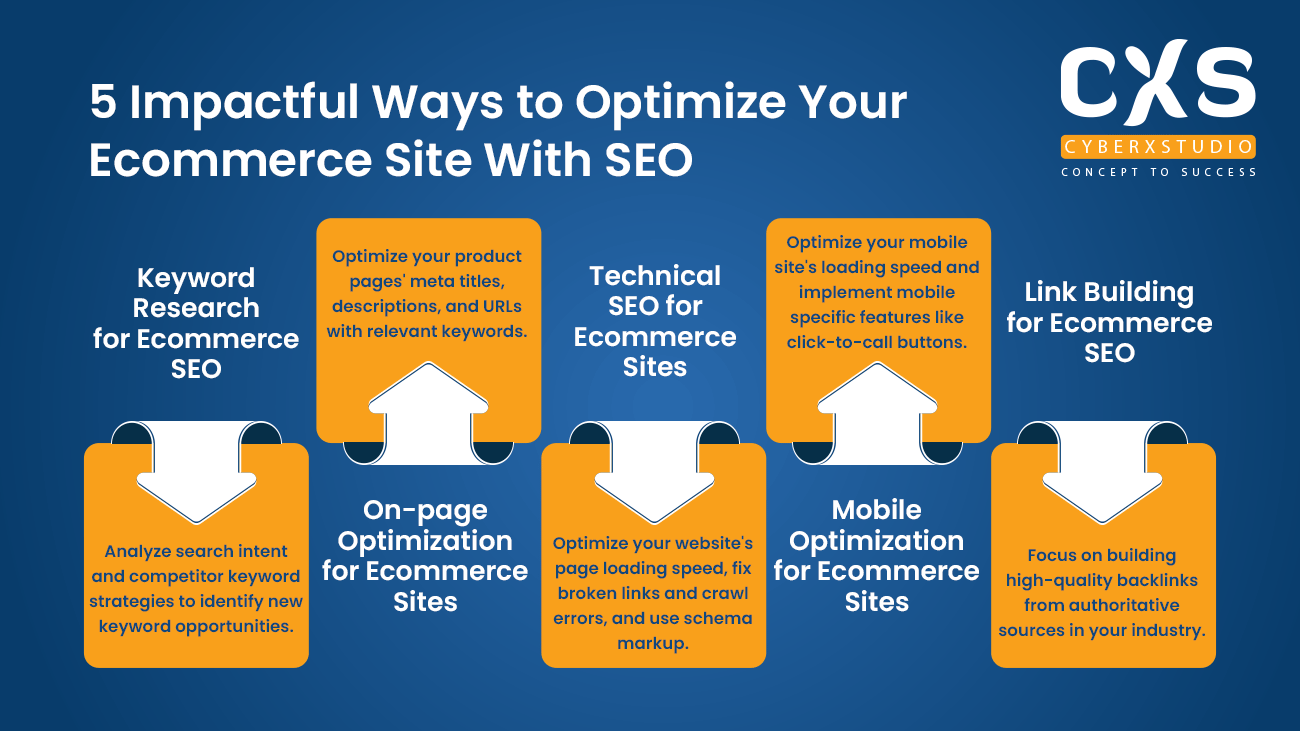
There must be more than an impressive website and high-quality products to stand out in the fiercely competitive ecommerce industry. Optimizing your website for search engines with the help of an ecommerce SEO services is essential to achieve real success. Effective ecommerce SEO tactics can boost your site’s visibility, attract visitors, enhance search engine rankings, and ultimately increase sales and revenue. When optimizing your ecommerce site for SEO, pay attention to these crucial areas:
Keyword Research for Ecommerce SEO
Effective Keyword Research for Ecommerce SEO is the foundation of your success, and it goes beyond simply identifying the most relevant and high-traffic keywords for your products and categories. It also involves analyzing your competitors, identifying gaps in the market, and understanding the intent behind the keywords to ensure that your website appears in front of the right audience.
On-page Optimization for Ecommerce Sites
On-Page Optimization for Ecommerce Sites is a critical aspect of ecommerce SEO that entails more than just incorporating relevant keywords. It also involves creating a user-friendly website architecture, optimizing images and videos, ensuring fast load times, and crafting compelling product descriptions and unique content that resonate with your target audience.
Technical SEO for Ecommerce Sites
Technical SEO for Ecommerce Sites is another area of critical importance that involves optimizing your website’s structure, speed, security, and mobile-friendliness to ensure search engines quickly crawl and index your web pages. This includes optimizing your website’s schema markup, fixing broken links, and ensuring that your website’s sitemap is up to date.
Mobile Optimization for Ecommerce Sites
Mobile Optimization for Ecommerce Sites has become increasingly important as more and more people use their mobile devices to browse and shop online. Therefore, optimizing your ecommerce site for mobile users is imperative to provide a seamless and hassle-free mobile shopping experience. This involves using a responsive design, optimizing page load times, and ensuring that your website is easily navigable on mobile devices.
Link Building for Ecommerce SEO
Link Building for Ecommerce SEO involves earning high-quality backlinks to your website to improve your search engine rankings and drive more traffic. This requires developing a robust link-building strategy, such as creating valuable content that other websites will want to link to, and leveraging social media platforms to reach out to influencers and build relationships with other websites in your industry.
By implementing these best practices for ecommerce SEO, you can improve your website’s visibility, drive more traffic, and ultimately boost your sales and revenue.
Content Marketing for Ecommerce SEO
In Ecommerce SEO, content marketing is critical in driving traffic to your site, building brand awareness, and increasing sales. By creating high-quality and engaging content that resonates with your target audience(dream buyer), you can improve your rankings and establish your brand as a thought leader in your industry.
Here are some key areas to focus on when it comes to content marketing for ecommerce SEO:
Importance of Content Marketing for Ecommerce SEO
Content marketing is essential for ecommerce SEO, as it involves creating and sharing valuable content that attracts and engages your target audience. Providing informative, entertaining, or educational content relevant to your products or industry can build trust with your customers, drive traffic to your site, and ultimately increase sales.
Types of Content for Ecommerce Sites
There are many different types of content that ecommerce sites can create to attract and engage their target audience. Some popular options include
- Blog posts
- Product reviews
- How-to guides
- Videos
- Infographics, and
- Social media posts
The key is to identify the types of content that resonate best with your target audience and align with your overall marketing strategy.
Creating High-Quality Content for Ecommerce Sites
When creating content for ecommerce sites, it’s essential to ensure that it is high-quality, unique, and relevant to your target audience. It includes conducting thorough research, incorporating relevant keywords, and following best practices for SEO. Additionally, you should ensure that your content is visually appealing and easy to read, with a clear call to action that encourages your audience to take action.
Importance of Product Descriptions for Ecommerce SEO
Product descriptions are critical to an ecommerce SEO strategy, as they provide valuable information to search engines and customers. Creating detailed, informative product descriptions incorporating relevant keywords and highlighting your product’s unique features and benefits can improve your search engine rankings, attract more qualified leads, and increase conversions.
Local Ecommerce SEO
As more consumers turn to online shopping, ecommerce businesses must optimize their online presence for local searches. This is where local ecommerce SEO comes in. In this section, we will discuss what local ecommerce SEO is, why it is crucial for ecommerce sites, and provide some tips for optimizing ecommerce sites for local SEO.
What is Local Ecommerce SEO?
Local ecommerce SEO refers to optimizing ecommerce websites for local searches, including improving the visibility of an ecommerce site in search engine results pages (SERPs) for location-based queries. For example, if a user searches for “women’s shoes in Los Angeles,” an ecommerce site that sells women’s shoes in Los Angeles would want to be visible at the top of the search results.
Importance of Local SEO for Ecommerce Sites
Local SEO services is crucial for ecommerce sites as it enables businesses and services to reach potential customers looking for products or services within a specific geographic area. By optimizing for local searches, ecommerce sites can increase their visibility and attract high-intent traffic, eventually leading to higher conversion rates and increased revenue. Let’s dig in for more detail.
- Increased visibility: Optimizing for local searches increases the chances of an ecommerce site appearing at the top of SERPs, leading to more visibility and clicks.
- Higher conversion rates: Local searches often indicate high purchase intent, which means that users who find an ecommerce site through local searches are more likely to make a purchase.
- Competitive advantage: Optimizing for local searches can help ecommerce businesses stand out from competitors and attract more local customers.
Tips for Optimizing Ecommerce Sites for Local SEO
Optimizing an ecommerce site for local SEO involves several vital strategies. We will highlight some tips, and by implementing these tips, ecommerce businesses can improve their search engine rankings, attract more local customers, and increase their online visibility. With the right approach to local SEO, ecommerce sites can gain a competitive edge and establish a strong presence in their target market. Have a look!
- Use location-based keywords Research: Include location-based keywords in page titles, meta descriptions, and throughout the website’s content.
- Create location-specific landing pages: Create landing pages that target specific locations and include relevant information such as local business listings, customer reviews, and store hours.
- Optimize for Google My Business: Claim and optimize a Google My Business listing for the ecommerce site, including accurate business information and customer reviews.
- Use schema markup: Implement schema markup to provide search engines with more information about the ecommerce site’s location, products, and services.
- Build local backlinks: Build backlinks from local websites and directories to improve the ecommerce site’s authority and visibility in local searches.
Measuring the Success of Your Ecommerce SEO Campaigns
Ecommerce SEO is a complex process that requires ongoing monitoring and measurement to ensure success. By tracking the appropriate metrics and using the right tools, ecommerce businesses can gain valuable insights into their SEO efforts and make data-driven decisions to improve their search engine rankings, attract more traffic, and increase sales.
In this section, we will discuss the importance of measuring the success of your ecommerce SEO campaigns, the key metrics to track, and the tools that can help you estimate your ecommerce SEO success.
Importance of Tracking your Ecommerce SEO Efforts
Tracking your ecommerce SEO efforts is essential for understanding the impact of your SEO campaigns on your business’s bottom line. By measuring the right metrics, you can evaluate your SEO strategies’ effectiveness, identify improvement areas, and finally make data-driven decisions to optimize your ecommerce site for search engines. Additionally, tracking your SEO efforts can help you justify your SEO investment to stakeholders and demonstrate the ROI of your campaigns.
Metrics to Track for Ecommerce SEO
Tracking the proper metrics is crucial for evaluating the effectiveness of your ecommerce SEO campaigns. Some key metrics to track include website traffic, keyword rankings, conversion rates, bounce rates, and average session duration. By monitoring these metrics, ecommerce businesses can identify areas for improvement and adjust their SEO strategies accordingly.
In addition to the metrics mentioned, there are a few other essential metrics that ecommerce businesses should track to measure the success of their SEO campaigns:
- Click-through rate (CTR) from search engine results pages (SERPs)
- Revenue generated from organic search traffic
- Number of organic search impressions
- Pages per session
- Time on page
Tracking these metrics can provide ecommerce businesses with a complete picture of their SEO performance and help identify specific areas for improvement. For instance, a high bounce rate may indicate that visitors are not finding what they want on a particular page. In contrast, a low conversion rate may suggest that the website needs to be more effectively communicating the value of its products or services. By analyzing these metrics and making data-driven decisions, ecommerce businesses can continually improve their SEO strategies and drive more traffic, leads, and sales.
Tools To Help Measure your Ecommerce SEO Success
Ecommerce businesses have access to various ecommerce SEO tools to help them measure the success of their campaigns. These tools provide valuable insights into different SEO metrics, including website traffic, keyword rankings, backlinks, and more. By utilizing these tools, ecommerce businesses can better understand their SEO performance and make data-driven decisions to improve their search engine rankings, attract more traffic, and ultimately drive sales.
Some of the top SEO tools for ecommerce sites include:
- Google Analytics: This free tool provides detailed insights into website traffic, user behavior, and more. Ecommerce businesses can use Google Analytics to track their SEO campaigns’ performance and identify improvement opportunities.
- Google Search Console:
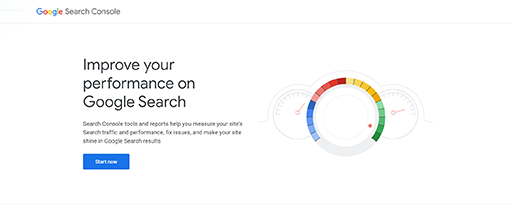
This tool provides valuable information about website performance in Google search results. Ecommerce businesses can use Google Search Console to monitor website health, identify crawling errors, and analyze search traffic data.
- SEMrush:

This fantastic tool provides a comprehensive suite of SEO tools, including keyword research, competitor analysis, and more. Ecommerce businesses can use SEMrush to identify opportunities to improve their SEO performance and stay ahead of the competition.
- Ahrefs:
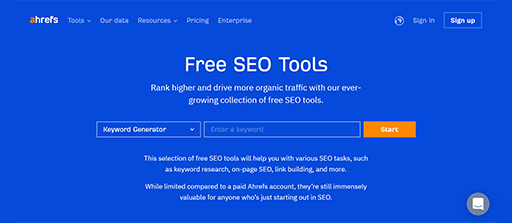
This tool provides robust backlink analysis and keyword research capabilities. Ecommerce businesses can use Ahrefs to identify backlink opportunities and improve search engine rankings.
- Moz:
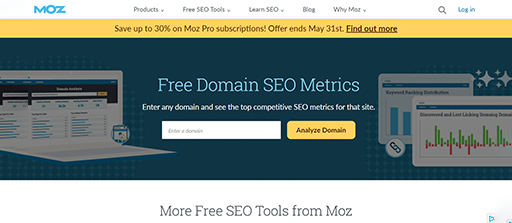
This tool offers a range of SEO tools, including keyword research, link building, and more. Ecommerce businesses can use Moz to improve rankings and drive more website traffic.
By using these and other SEO tools, ecommerce businesses can gain a more profound understanding of their SEO performance, identify areas for improvement, and make data-driven decisions to optimize their websites for search engines.
Shopify and SEO: The Dynamic Duo For Dominating Your Online Market
Shopify is a powerful ecommerce platform allowing businesses to create and manage virtual stores easily. However, more than simply having a Shopify website is required to attract customers and generate sales. To succeed in the competitive world of ecommerce, businesses must optimize their Shopify websites for search engines.

In this section, we’ll explore the essentials of Shopify SEO, including expert tips and services available to help you achieve higher rankings, attract more traffic, and drive revenue. Whether you are a seasoned ecommerce pro or just starting, this section will provide the knowledge and tools you need to take your Shopify store to the next level.
How to do SEO for Shopify Website
Shopify is a popular ecommerce platform that offers businesses a range of tools to create and manage their online stores. However, to succeed in today’s competitive online market, businesses need a strong SEO strategy. Optimizing your Shopify website for search engines can help improve your website’s visibility, attract more traffic, and drive sales. Here are vital steps to consider when doing SEO for your Shopify website:
Here are vital steps to consider when doing SEO for your Shopify website:
- Optimize your website structure, including page titles, descriptions, and URLs, to make it easier for search engines to index and crawl your content.
- Conduct thorough keyword research to identify the relevant keywords for your business, and then incorporate those keywords into your content.
- Ensure your website is mobile-friendly and loads quickly, as these factors can significantly impact user experience and search engine rankings.
- Include high-quality images and videos on your website to enhance user engagement and reduce bounce rates.
- Regularly update your website with fresh, relevant, and engaging content to keep visitors returning and attract search engine crawlers.
Shopify SEO Services
Shopify offers an array of the best ecommerce SEO services to assist businesses in boosting their search engine rankings and driving traffic to their websites. These services comprise keyword research, on-page optimization, content creation, and link building. Along with the in-house SEO services, several third-party SEO services are available that specialize in optimizing Shopify websites, such as Plug-in SEO, Booster Apps, and SEO Manager. With these services, Shopify businesses can enhance their online presence and attract more potential customers.
Here are some benefits of using Shopify SEO services:
- Professional keyword research to identify the best keywords for your business
- On-page optimization to improve website structure and content
- Creation of high-quality content that is optimized for both users and search engines
- Link building to improve domain authority and search engine rankings
- Regular monitoring and reporting on your website’s SEO performance
SEO Tips for Shopify
Here are some additional tips to improve the SEO of your Shopify website:
- Use a simple, clean website design to improve user experience and reduce bounce rates.
- Optimize your product pages with unique titles, descriptions, and high-quality images.
- Use social media platforms to promote your products and drive more traffic to your website.
- Use customer reviews and ratings to increase credibility and trustworthiness.
- Leverage influencer marketing to expand your reach and drive more traffic to your website.
- Monitor your website performance regularly and make data-driven decisions to optimize your SEO strategy.
Ecommerce SEO Best Practices
As the trend of online shopping continues to surge, the significance of optimizing ecommerce websites for search engines must be considered. To achieve this, the input of an ecommerce SEO expert is vital. This section will delve into the best SEO practices for ecommerce, highlighting the dos and don’ts, tips for keeping up with trends, and typical errors to avoid.
Dos and Don'ts of Ecommerce SEO
When it comes to ecommerce SEO, there are certain dos and don’ts that businesses should keep in mind. By following best practices and avoiding common mistakes, ecommerce websites can improve their visibility in search engine results pages (SERPs) and drive more traffic to their pages.

Tips for Staying Up-To-Date with Ecommerce SEO Trends:
The world of ecommerce SEO is continuously evolving, with new and recent trends and best practices constantly emerging. Ecommerce businesses must keep up with these changes proactively to stay ahead of the curve.
We’ll share some tips for staying up-to-date with ecommerce SEO trends and remaining competitive in the online marketplace.
- Follow industry experts and thought leaders on social media to stay informed about the latest ecommerce SEO trends.
- Attend conferences and webinars focused on ecommerce and SEO.
- Read industry publications and blogs, such as Moz and Search Engine Journal.
- Experiment with different strategies to see what works best for your business.
Common Ecommerce SEO Mistakes to Avoid
Ecommerce SEO can be a complex and challenging endeavor with many pitfalls. Unfortunately, even minor missteps can significantly impact your search engine rankings and overall online visibility. To help you avoid these common pitfalls, we’ll outline some of the most common ecommerce SEO mistakes and advise on how to steer clear of them.
- Using generic product descriptions instead of unique, compelling copy that highlights the benefits and features of your products.
- Ignoring technical SEO, such as page speed optimization and mobile responsiveness.
- Focusing solely on product pages and neglecting other areas of your website, such as the blog and homepage.
- Not optimizing for local search can be especially important for ecommerce businesses with physical store locations.
To Sum Up
In conclusion, ecommerce SEO services is critical to any online business strategy. It enables businesses to reach more potential customers, boost their online visibility, and ultimately increase their sales and revenue. By using the right keywords, optimizing their website and content, and leveraging the power of content marketing and link building, ecommerce businesses can effectively compete in the online marketplace and dominate their market.
However, ecommerce SEO is an ever-evolving field that requires ongoing attention and adaptation to keep up with the recent trends and best practices. By following ecommerce SEO’s dos and don’ts, staying up-to-date with the latest trends, and avoiding common mistakes, ecommerce businesses can ensure their online success and achieve their business goals. With the right tools, techniques, and strategies, ecommerce businesses can position themselves for long-term growth and success in the online marketplace.
FAQs
SEO can be a highly effective means of boosting revenue and profits. Ecommerce sites rely on a continuous influx of new customers and a loyal base of repeat buyers.
By acquiring new customers to drive revenue, it can be easier for an ecommerce business to expand. SEO is a valuable tool to attract potential new customers who are more likely to convert into loyal buyers.
To get started with eCommerce SEO, consider implementing the following best practices:
- Conduct thorough keyword research to identify relevant search terms.
- Optimize product pages to enhance search engine rankings.
- Ensure your website is user-friendly and easy to navigate.
- Incorporate long-tail keywords into your content strategy.
- Maintain a simple URL structure to improve search engine visibility.
Shopify SEO is optimizing a Shopify website for search engines to improve its visibility, attract more traffic, and drive more sales. It involves optimizing product pages, meta descriptions, and other website elements and using Shopify’s built-in SEO tools and apps to improve rankings.
Producing well-crafted content that captivates the reader’s attention improves search engine rankings and traffic and increases the probability of generating quality backlinks from other websites.

Ayza Rizwan
Content Writer at CyberXStudio
Ayza Rizwan is a passionate Content Writer who pours her heart into every word she crafts. Before joining CXS in 2022, her journey began as a teacher, but her passion for blog writing later led her to freelancing. This diverse background brings a fresh and unique perspective to her writing, captivating readers with her insightful and engaging style.

